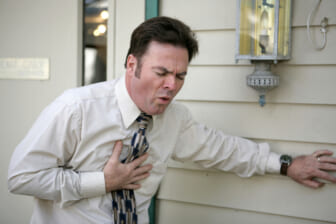
Many times, urology problems like incontinence and bladder infections get associated with women. While women are the ones who often deal with these issues, men may suffer from them more often than you think.
If the problem is severe enough, it can affect a man’s self-esteem, confidence, and quality of life.
Let’s look at 5 common urology problems that affect men and start giving these guys some support.
1. Urinary Tract Infection
Cause: Urinary tract infections happen when bacteria get into the urinary tract and do not get flushed out through normal processes. Believe it or not, men do get these infections too.
If you have a UTI, you may feel burning, itching, or pain during urination. You may also experience incontinence, foul-smelling urine, or blood in urine. In any of these cases, you should see a doctor.
Treatment: You’ll likely receive antibiotics to fight off the bacteria and may opt for pain medication as well. To prevent a UTI, drink plenty of fluids and use the restroom often. Don’t try to dismiss the urge for long periods of time.
2. Erectile Dysfunction
Cause: Erectile dysfunction can prove extremely discouraging for men. The problem happens when a man cannot achieve or keep an erection during sexual intercourse. It can be linked to anxiety and mental stress but also may be due to several physical issues like diabetes.
While older men may get ED more often, young sufferers should know that they’re not alone. The condition affects a wide variety of age groups, including men in their 20s and 30s.
Treatment: First, a doctor should try to rule out any underlying health conditions that may be contributing to the problem. Then, he will probably offer an oral medication, such as Viagra. These oral medications simply boost a natural chemical commonly released during intimacy.
In addition, you may need testing to rule out low testosterone levels as a cause. Finally, your doctor may encourage regular exercise to improve the symptoms.
3. Enlarged Prostate
Cause: Men actually go through two phases of growth in this bodily area throughout their lives. The first happens when most people would expect it—during puberty—but the second occurs around 25 years of age.
During this growth phase, the prostate enlarges. Sometimes, the prostate enlarges enough to press on the urethra and weaken the bladder, and the problem only worsens with age. According to the National Institutes of Health, an enlarged prostate is the most common prostate issue in men over 50.
Common symptoms include the need for frequent urination, incontinence, delayed start or strain during urination, pain or bloody urine, and an inability to empty the bladder. Since these symptoms can resemble several other issues, you should seek medical advice about your specific symptoms.
Treatment: A doctor may recommend medication that will slow or stop prostate enlargement. He may also recommend that you don’t drink fluids before bed, reduce caffeine, or exercise your pelvic floor muscles. In severe cases, you may need to look into several procedures or surgery to correct the problem.

Are you pouring on too much salt?
4. Prostatitis
Cause: Prostatitis is when a man’s prostate gland gets infected and inflamed. This infection can narrow the pathway for the urethra, causing pain during urination.
In addition, you may experience pain in the groin area or lower back, cloudy or bloody urine, and flu-like symptoms. The infection can be caused by bacteria, although doctors often cannot link non-bacterial cases to a source.
Treatment: If prostatitis resulted from bacteria, a doctor will prescribe antibiotics to fight the infection. He may also recommend alpha-blockers to relax the muscles where the prostate connects to the bladder. For comfort, he may prescribe anti-inflammatory medicines.
5. Urinary Incontinence
Cause: Last but not least, men can suffer from urinary incontinence. Symptoms include accidental urination or dribbling during coughing or sneezing, inability to completely empty the bladder, frequent urination, and a sudden yet urgent need to use the restroom.
The incontinence can be caused by damage to the nerves surrounding the urethra, weakened pelvic muscles, or other prostate or health problems. A doctor should rule out any other issues that may be causing the incontinence first.
Treatment: If no other underlying problem is causing the incontinence, a doctor may try lifestyle changes, recommend getting plenty of regular exercise and fiber (to avoid constipation), and advise strengthening pelvic floor muscles. If the problem persists or is severe, he may recommend surgery.
While men may not experience as many UTIs as women, they can still get this infection and several other urology problems. They should not dismiss them but should instead seek medical advice about their specific symptoms. Headed off early, men can get these common urology problems under control and return to their normal schedules.


